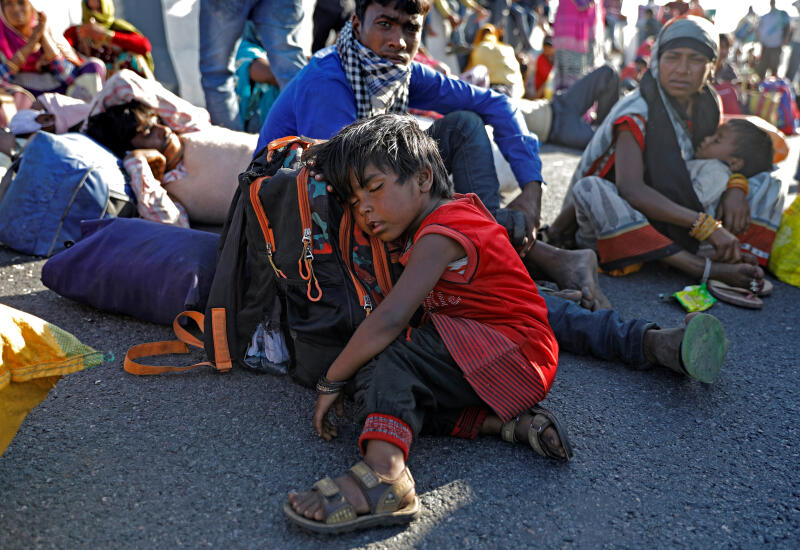Coronavirus: India's migrant workers pose major challenge to country's lockdown
Sign up now: Get insights on Asia's fast-moving developments

The daughter of a migrant worker sleeps on a highway as they failed to get a bus to return to their village in New Delhi, India, on March 29, 2020.
PHOTO: REUTERS
NEW DELHI - Has Prime Minister Narendra Modi's 21- day lockdown gone off track?
The mass movement of migrant labourers across the country is seen to have run contrary to efforts to stop the spread of Covid-19.
Hundreds of thousands of migrant workers, unable to pay for food or rent with economic activity grinding to a halt, many with children in tow, started a long march from cities to their homes many hundreds of kilometres away.
Hundreds congregated at bus stations and along borders even as other categories of people remain indoors and practised social distancing.
While authorities initially allowed the exodus that unravelled after the lockdown, which started on March 24 at midnight, the federal government on Sunday evening asked states to close their borders and clear all crowds.
Police on Monday (March 30) rounded up migrant workers and sent them back to their localities or shelters, even as state governments announced food and shelter but punitive action as well for those who refuse to comply.
Still, is it too late, health experts wondered .
"The lockdown was good for well-to-do people. For migrant workers, there is no safety margin. We just hope the lockdown was early enough that none of them were infected.
"But the probability of no one being infected is very, very low," said Dr T Jacob John, a virologist who earlier headed the Indian Council for Medical Research's Centre for Advanced Research in Virology.
He noted that the lockdown was essential and the government got its timing right but faltered in implementation.
"It was the right time to think about lockdown. If one person is infected, can you imagine he or she will start a domino effect. So we are sitting on an unknown risk until it shows itself," he said.
India took stringent measures, alarmed by how the pandemic laid waste to the best health systems in the world from China to Italy.
This included grounding international and domestic flights and train services followed by a country-wide lockdown for 21 days.
Though India's rate of infection has not spiked substantially like some other countries, concerns remain that the real picture could be completely different in the face of inadequate testing.
India has 1,071 coronavirus cases, with 29 deaths reported so far.
The question remains whether the state governments can ameliorate the suffering of the poor migrant workers, who are employed in various sectors, from construction to manufacturing, as well as delivery men.
"People have been asked to stay back. Where will they stay. On the roads? I am getting reports of people stuck in different places. It is still a humanitarian crisis," said Mr Sudhir Katiyar, Secretary of the Centre for Labour Research and Action.
"How will the government manage shelters for so many migrants. It's going to be another disaster."
Indian media reported that the Supreme Court, which has taken up the migrant issue, noted: "The fear and panic is a bigger problem than the coronavirus."
Already, reports of deaths among those trying to reach home have surfaced. At least 22 were killed, including four migrants who were hit by a truck in the Western state of Maharahstra.

A 39-year-old migrant worker died of a heart attack after walking more than 200km through the central state of Uttar Pradesh.
Mr Modi acknowledged on Sunday, on his radio show, the problems faced by the poor. He noted the poor must be thinking why he has put them in so much difficulty.
"I ask for forgiveness from my countrymen for the hardship, especially the poor," he said. The government had announced a 1.7 trillion rupee (S$32.3 billion) financial package for the poor.
Still the situation remained chaotic on Monday.
In Gujarat state, 93 workers were held for defying the lockdown, Indian media reported.
Mr Abhijit Banerjee and Ms Esther Duflo - winners of the 2019 Nobel Prize in Economics in 2019 - said even more aid for the poor is needed, adding that what the government is offering is "small potatoes".
"Without that, the demand crisis will snowball into an economic avalanche, and people will have no choice but to defy orders," they wrote in an opinion piece in the daily newspaper Indian Express .
They also warned that India needed "to be prepared for the disease to explode in pockets all over the country, including some of the more remote rural areas, over the next many months."
For the migrant workers forced on the streets, livelihood issues remain their main worry.
"We don't have anything to eat or drink. Work is not happening. What can we do? We are not able to pay rent and are being chased away by our landlords," said Mr Raju Bhai, who worked in construction as a daily wage labourer.
"We just want to go home where we know we will get some wheat or rice at the least."


